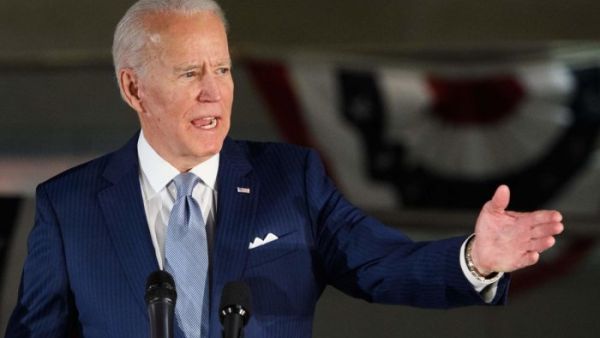Those who were opposed to former President Barack Obama’s foreign policy, mainly in the Middle East, are not thrilled to see President-elect Joe Biden filling key national security positions with former Obama’s advisers and staff.
President Donald Trump reversed Obama’s foreign policy in almost every issue except Syria. The Trump administration pulled out of the Iran deal, moved the US Embassy to Jerusalem, recognized Israel’s annexation of the Syrian Golan Heights and reversed the US long-standing policy opposed to the expansion of Israeli settlements in occupied Palestinian territories, and so on.
JOE #BIDEN’s policy on #Syria ... to “mobilize other countries do I support Syria’s reconstruction” pic.twitter.com/wANODhiHDG
— Ibrahim Hamidi ابراهيم حميدي (@ibrahimhamidi) August 29, 2020
But when it came to Syria, the minimum engagement by Washington remained unchanged.
Since Obama issued the red line warning to the Syrian regime and then settled for the dismantling of its chemical weapons arsenal, the US took the back seat and restricted its involvement to humanitarian assistance and diplomatic efforts in order to deny the regime a lifeline support under the banner of reconstruction of the war-torn country to push for a political solution to the conflict. The US maintained a limited military presence, mainly as part of its war against the militant Daesh (ISIS) group. Their support of a Kurdish group and control over oil fields were also related to fighting Daesh and denying the group cash revenues from their smuggling operations.
"Why Syria will be low on Biden's list of foreign policy priorities."
— Queen Mary University of London (@QMUL) November 16, 2020
Christopher Phillips from the School of Politics writes an opinion piece for the @MiddleEastEye on Biden’s election and what this means for US policy on Syria. https://t.co/U447On7bVO
The fiercest battles and the refugee crisis peaked under the watch of the Obama administration. However, the gains of the Syrian military with the help of Russia and Iran, materialized under the Trump administration that turned a blind eye while maintaining its tough rhetoric and increasing sanctions against the regime’s men.
Historically, Washington had no close bilateral relationship with Damascus and diplomatic rapprochement came after Saddam Hussein invaded Kuwait and the late Syrian President Hafez al-Assad joined the US-led coalition to liberate Kuwait. Hafez Assad’s move paved the way for US-sponsored peace talks between Israel and Syria. Currently, sees there’s no value for Washington to spend diplomatic credit in opening up to Syria, as Israel and the US doubt the ability of the weak Bashar regime to enter talks toward a peace settlement, similar to what other Arab countries did in the last months of the Trump administration.
But to further understand Washington’s reluctance to intervene in Syria, it is essential to assess the relationship between Vladimir Putin’s Russia and the successive US administrations. In his latest book, Rage, American investigative reporter Bob Woodard quoted former Secretary of State Rex Tillerson describing his conversation with Putin.
But Rex Tillerson at State was fine, despite his utter lack of qualifications in that field?
— Kevin M. Kruse (@KevinMKruse) December 9, 2020
Or Ben Carson at Housing and Urban Development?
Betsy DeVos at Education? Jesus, she didn't even have any experience as a *parent* of a kid in public schools, much less in ed policy. https://t.co/GG2Fnq8tEL
Tillerson, who was at the time the CEO of the US oil giant ExxonMobil, enjoyed close relationship with Putin due to the size of investment of ExxonMobil in the Russian oil industry. According to Woodard’s book, Tillerson who was briefing President-elect Trump about Russia during the job interview told him that Putin didn’t trust Obama since the Libya’s crisis.
Despite Putin’s accommodation to Obama to secure a UN Security Council resolution to intervene militarily in the Libyan war, Putin didn’t trust Obama.
“According to administration officials, General Lloyd Austin...told the White House that the Islamic State was ‘a flash in the pan.’ This analysis led Obama...to describe the constellation of jihadist groups in Iraq and Syria as terrorism’s ‘jayvee team.’” https://t.co/8k0w7wtCUA
— Lucas Tomlinson (@LucasFoxNews) December 8, 2020
I “told him I’m going to abstain for you,” Tillerson quoted Putin saying Obama.
“So Putin I think was trying to say to me, I was trying to work with this guy,”
Tillerson continued.
“And when Obama drew the red line over the use of chemicals, Putin and Obama talked again. And Putin said, ‘Okay, I understand if you think you have to respond to that. But I’m not going to allow you to make the same mistake in Syria that you made in Libya because I have a stake in Syria. So let’s understand one another.’”
Susan Rice, who was a disaster to President Obama as National Security Advisor, is now telling us her opinion on what to do in Syria. Remember RED LINE IN THE SAND? That was Obama. Millions killed! No thanks Susan, you were a disaster.
— Donald J. Trump (@realDonaldTrump) October 19, 2019
That’s what Putin said to Obama, based on Tillerson’s account to Trump. Putin’s bitter experience with Obama when it came to Libya became known as the “Libyan Hangover,” a term frequently repeated by Russian diplomats when discussing Syria with American and European counterparts.
So how would the upcoming Biden administration, staffed with officials who witnessed the evolution of the US policy vis-a-vis the Syria deal with all its tragedy, would be mainly affected by the relationship between Biden and Putin. Can Biden forge a trust relationship with Putin who mistrusted Obama?
The national security team nominated by Biden expressed its desire to make human rights a condition to warming relations with countries around the world. But in the past, political deals and national interests prevailed at the expense of human rights and democracy. The US policy toward Syria will undergo close review by the upcoming administration, but no one should be under the illusion that it will be a major shift from its current policy.
The first indication would be how the Biden White House will react to the outcome of the Syrian presidential election this year. Can Russia rehabilitate the regime of Bashar Assad with the promise of brokering a peace deal with Israel? And how will Iran react to such a possibility may explain a lot of anticipated events in the Syrian theater in the months to come.
Mouafac Harb is a veteran American-Lebanese journalist based in Beirut.
This article has been adapted from its original source.








